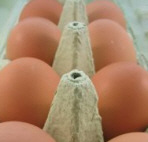



Intensive Egg Production and Salmonella
UK - According to the the Soil Association, a recent government survey shows that organic laying hen farms have a significantly lower level of Salmonella, a bacterium that causes one of the commonest forms of food poisoning worldwide. |
| Photo: StockXchange |
The survey of the prevalence of Salmonella species on commercial laying farms in the United Kingdom, published in The Veterinary Record, showed that 23.4 per cent of farms with caged hens tested positive for salmonella compared to 4.4 per cent in organic flocks and 6.5 per cent in free-range flocks.
The research also showed that the highest prevalence of salmonella occurred in the largest holding size category (30,000 birds or more). This was over four times the average level of salmonella found in flocks closer to the maximum size allowed under Soil Association organic standards.
These results support Hugh Fearnley-Whittingstall and his ‘Chicken Out' campaign to improve the welfare standards of chicken production. It also adds weight to the argument that although ‘free-range’ production would certainly be a positive step forward, it is still some way behind the Soil Association's organic poultry systems [5], which ensure truly free range birds and offer the highest standards of animal welfare as acknowledged by respected animal welfare groups such as Compassion in World Farming.
Emma Hockridge, Soil Association policy department said: “Anyone watching Hugh and Jamie reveal the appalling conditions millions of chickens endure in the cramped, windowless sheds of factory farms will be in no doubt that organic and free-range chickens have a better life.
"This research confirms the Soil Association’s view that there are serious potential human health implications from such intensive systems. Whilst Salmonella food poisoning can be avoided through proper cooking of eggs and meat, anything that reduces the incidence of this bug should be encouraged – like genuine free-range, organic farming.”








